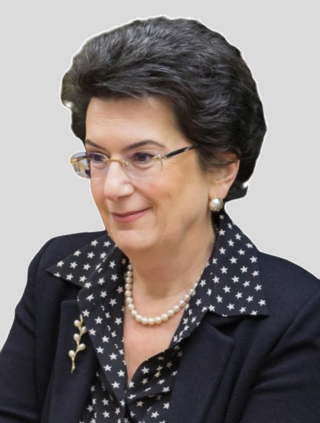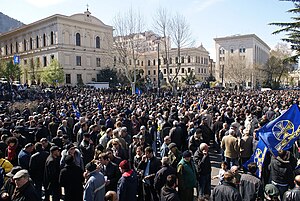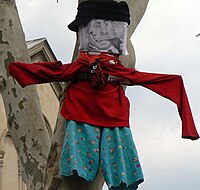
Mikheil Saakashvili is a Georgian and Ukrainian politician and jurist. He was the third president of Georgia for two consecutive terms from 25 January 2004 to 17 November 2013. From May 2015 until November 2016, Saakashvili was the governor of Ukraine's Odesa Oblast. He is the founder and former chairman of the United National Movement party. Saakashvili heads the executive committee of Ukraine's National Reform Council since 7 May 2020. In 2021 he began serving a six-year prison sentence in Georgia on charges of abuse of power and organization of an assault occasioning grievous bodily harm against an opposition lawmaker Valery Gelashvili.

Nino Burjanadze is a Georgian politician and lawyer who served as Chairperson of the Parliament of Georgia from November 2001 to June 2008. As the first woman, she has served as the acting head of state of Georgia twice; the first time from 23 November 2003 to 25 January 2004 in the wake of Eduard Shevardnadze's resignation during the Rose Revolution, and again from 25 November 2007 to 20 January 2008, when Mikheil Saakashvili stepped down to rerun in the early presidential elections. She withdrew into opposition to Saakashvili as the leader of the Democratic Movement-United Georgia party in 2008. In October 2013, she ran in the presidential election, competing against 22 candidates. She ended third with 10 percent of the vote.

Irakli Okruashvili is a Georgian politician who had served on various important posts in the Government of Georgia under President Mikheil Saakashvili, including being the Minister of Defense from December 2004 until being dismissed in November 2006.

Irakli Alasania is a Georgian politician, soldier and former diplomat who served as the Minister of Defense of Georgia from 2012 to 2014. He was Georgia's Ambassador to the United Nations from September 11, 2006, until December 4, 2008. His previous assignments include Chairman of the Government of Abkhazia(-in-exile) and the President of Georgia's aide in the Georgian-Abkhaz talks. Soon after his resignation, Alasania withdrew into opposition to the Mikheil Saakashvili administration, setting up the Our Georgia – Free Democrats party in July 2009. In 2012 Alasania was appointed Minister of Defense, a position he held until 2014.

The Adjara crisis, also known as the Adjarian revolution or the Second Rose Revolution, was a political crisis in Georgia's Adjaran Autonomous Republic, then led by Aslan Abashidze, who refused to obey the central authorities after President Eduard Shevardnadze's ouster during the Rose Revolution of November 2003. The crisis threatened to develop into military confrontation as both sides mobilized their forces at the internal border. However, Georgia's post-revolutionary government of President Mikheil Saakashvili managed to avoid bloodshed and with the help of Adjaran opposition reasserted its supremacy. Abashidze left the region in exile in May 2004 and was succeeded by Levan Varshalomidze.

In 2007, a series of anti-government protests took place across Georgia. The demonstrations peaked on 2 November 2007, when 40,000–50,000 rallied in downtown Tbilisi, the capital of Georgia. People protested against the allegedly corrupt government of president Mikheil Saakashvili. Protests triggered by detention of Georgian politician Irakli Okruashvili on charges of extortion, money laundering, and abuse of office during his tenure as defense minister of the country were organized by the National Council, an ad hoc coalition of ten opposition parties, and financed by the media tycoon Badri Patarkatsishvili. Demonstrations occurred both in September and November 2007 and were initially largely peaceful. The protests went downhill by 6 November 2007, but turned violent the next day when the police, using heavy-handed tactics, including tear gas and water cannon, unblocked Rustaveli Avenue, Tbilisi's main boulevard, dislodged the protesters from the territory adjoining to the House of Parliament, and prevented the demonstrators from resuming the protests. The government accused the Russian secret services of being involved in an attempted coup d'état and declared a nationwide state of emergency later that day which lasted until 16 November 2007.

Presidential elections were held in Georgia on 5 January 2008, moved forward from autumn 2008 by President Mikheil Saakashvili after the 2007 demonstrations.

Levan Mikeladze was a Georgian diplomat and politician. He was Georgia's Ambassador to Austria, to United States and to Switzerland. Soon after his resignation, Mikeladze announced his withdrawal into opposition to the Mikheil Saakashvili administration and joined the Alliance for Georgia, party led by Irakli Alasania. On April 26, 2009 he died of a heart attack.
The 2011 Georgian protests were a series of anti-government protests in Georgia against President Mikheil Saakashvili.

Parliamentary elections were held in Georgia on 1 October 2012. The opposition Georgian Dream coalition of billionaire businessman Bidzina Ivanishvili won a majority of the seats. President Mikheil Saakashvili conceded his party's defeat.
Events in the year 2012 in Georgia.

Irakli Garibashvili is a Georgian politician and a former business executive who served as the prime minister of Georgia between 22 February 2021 and 29 January 2024. He had previously served as prime minister from 20 November 2013 until his resignation on 30 December 2015. Garibashvili is a member of the Georgian Dream party and has served as the party's chairman since 1 February 2024. He entered politics with his long-time associate Bidzina Ivanishvili, in October 2012.
In 2013, Georgia finalized its first-ever peaceful change of power and transition to a parliamentary republic. The Georgian Dream-dominated government, which came to power after defeating, in October 2012, the United National Movement led by the outgoing President Mikheil Saakashvili, promised more democratic reforms. The Georgian Dream candidate Giorgi Margvelashvili won the presidential election in October 2013 and the new constitution significantly reducing the authority of the president in favor of those of the prime minister and government came into effect. In November, the leader of the Georgian Dream, Prime Minister Bidzina Ivanishvili announced his withdrawal from politics as promised earlier, and the Parliament of Georgia approved his nominee, Irakli Garibashvili, as the country's new head of government.
The following lists events that happened during 2015 in Georgia.
The events in 2010 in Georgia.

The 2019 protests in Georgia, also known as Gavrilov's Night, refers to a series of anti-government and snap election-demanding protests in the country of Georgia.

The 2020–2021 Georgian political crisis was a political crisis in Georgia that resulted from allegations by opposition parties that the 2020 Georgian parliamentary election was rigged. The opposition accused the ruling Georgian Dream party of election fraud and did not recognize the results. They announced protests and parliamentary boycott. The opposition held a rally on November 1, a day after the elections, and called for snap parliamentary elections. On November 2, the eight opposition parties refused to enter parliament. In February 2021, Prime Minister Giorgi Gakharia resigned over plans to arrest opposition leader Nika Melia, which occurred on 23 February.
Levan Khabeishvili is a Georgian activist and politician who has served as a Member of Parliament since 2020.

The second government of Irakli Garibashvili was the government of Georgia, led by Irakli Garibashvili as the Prime Minister from February 22, 2021 until January 29, 2024. Following the resignation of Giorgi Gakharia, the ruling Georgian Dream party nominated former Prime Minister and then-Minister of Defence Irakli Garibashvili to form a government. His cabinet was quickly confirmed by the Parliament four days later. The government was dissolved after Prime Minister Garibashvili's resignation on January 29, 2024. Garibashvili cited the rotation process as the main reason for his resignation, implying that other people in the ruling party should also be given a chance to lead. Garibashvili took up the offer to become the Chairman of the Georgian Dream party.

The 2023–2024 Georgian protests are a series of street demonstrations taking place throughout Georgia over parliamentary backing of a proposed "Law on Transparency of Foreign Influence", which requires NGOs to register as "agents of foreign influence" or "organizations carrying the interests of a foreign power" if the funds they receive from abroad amount to more than 20% of their total revenue.

















